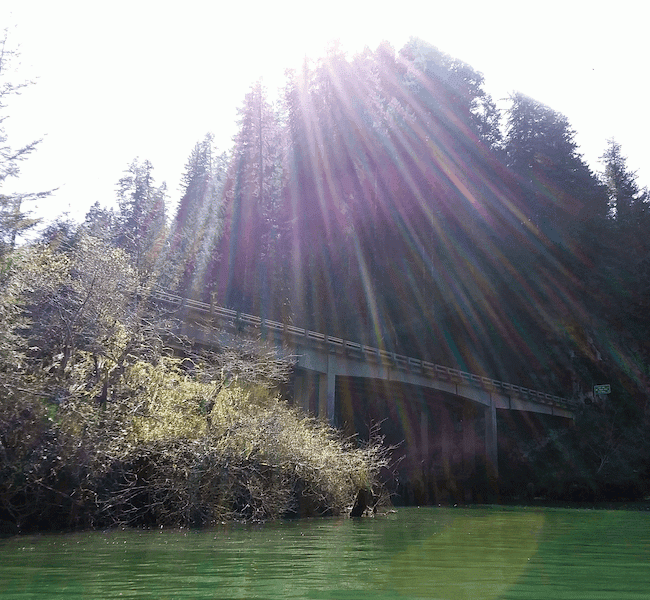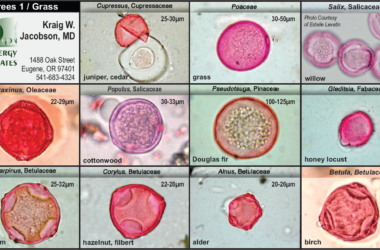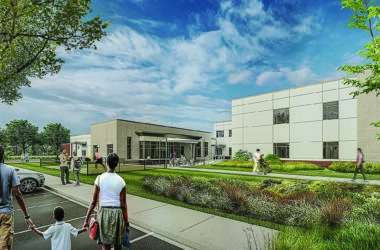 A kayak-level view of Mill Creek emptying into the Umpqua River as it passes the turn off of Highway 38 to Loon Lake. MARTHA McREYNOLDS Jr./THE CHRONICLE
A kayak-level view of Mill Creek emptying into the Umpqua River as it passes the turn off of Highway 38 to Loon Lake. MARTHA McREYNOLDS Jr./THE CHRONICLE
Greetings to you, fellow hunkerers, during these weird times. I hope this week finds you safe, sane and enjoying an expanding sense of flexibility, patience and kindness towards yourself and others. It’s gonna be a bumpy ride.
Last month I was minding my own business, hugging people, fixating on things barely remembered now, when a whisper of a news story reached my ears: “There’s a run on toilet paper. Something bad is coming toward us.” Wha?!
The Great Hunker was on. No lead-up. No chance to stockpile, learn, consider, mull, ask others questions, wrap my head around anything.
Days before, I was kayaking on the Umpqua River for the first time ever. Decades of passing the Scottsburg boat ramp, yearning to find a way onto that water but responding to that need with helplessness and mystery were ended that day. Eventually. At first there was some not-so-real fear to get over.
The boat was off the car, bobbing half in, half out of the water on the ramp as I stood looking across the gorgeous, wide flow. Upstream, work on the new bridge seemed to be carving a new world at the foot of a mountain whose toes rested in the river. Velvety, dense fir and oak forest sweetened the air. Rapids upstream gave out to swift, shallow, dancing water devoid of any other human.
I encouraged myself that the far-bank houses would be behind me soon and the lush Oregon forest would bound the river and me. It was one of those late-winter days that gives hope in the sun’s warmth, carried by a salty breeze from the ocean a handful of miles west.
All that and I still tried to talk myself out of getting into the boat, tummy fluttering a nervous alarm. Little voices said I didn’t belong there; something bad would be my reward for this somehow bad judgment. Like I didn’t belong there; that it wasn’t safe to be out there alone; that my 16-foot sea kayak wouldn’t handle well in the tidal river.
I negotiated a five-minute float along the bank going upriver so I could float back to the ramp and bail out if the fear won. It was “Go time.”
The rest is history. Two strokes in, laughing, I turned the boat downstream and took my chance. It was glorious.
 MARTHA MCREYNOLDS JR./PHOTO
MARTHA MCREYNOLDS JR./PHOTO
The water was cold and shallow. An eagle flew overhead as if flight was normal. The sun twinkled on the water. An upstream glance showed blinding quicksilver on the dancing water coming at me, and a memory of morning floats on quicksilver wild and scenic rivers in the West washed over me as if I was sitting on each of those rivers again all at once. I was happy, warm, safe, and aloft of water – my very real safe place for decades.
A few hours later, approaching the ramp, I marveled at how different the river looked on the return. But it wasn’t; the only thing different was me.
I keep having to learn that fear is a trick I play on myself. In these supremely weird times, I hope you’ll entertain this thought exercise with me: perception is self-interested. It’s how we’re made, this seeing of what we want, what we are expecting. I wanted to see a monster in the river. I wanted my fear to win because it sends me back to somewhere safe and familiar. I packed the fear along with my straps, life vest, lunch, paddle and was ready, almost eager, to submit.
Fear is a construct. So are society’s institutions: religion, education, government, defense, community and whatever else is bigger than the individual. If our perceptions are self-interested, often formed to match our limited expectations and thought to be as solid as concrete or law, we are the creators of our worlds. Even if we are wrong, right?
And what if, in fear, we are wrong about a few things, just as I was wrong about the Umpqua float?
Please join me in facing fear and chasing it off. Please give yourself and others the benefit of the doubt that everyone is doing the best they can under constantly changing conditions. Please don’t believe everything you are told or read. Please take time away from the news and the internet to poke your head outside and understand that you are a glorious, good, sentient being that has vast amounts of courage, love, compassion and hope that is only at the start of being tested.
In the near future, my bet is that we’ll look at this time as a honeymoon period as some things get worse. Since at least the beginning of the Industrial Revolution, we’ve been able to create lives removed from natural laws. We don’t worry about where our food comes from, can travel faster than horseback without much thought, travel around the world with ease, light night as if it’s day; the list goes on. The mere suggestion of a shortage of toilet paper sends us into a communal panic attack, even before we understand how the TP is going to keep us safe, or why we are hoarding it.
We are going to have to get on top of this fear thing, and I ask that we spend time trying to do that now. Something powerful is happening around us, so big we can’t even really make sense of the borders, the metrics, the effects. We just don’t know, but we get that it is bad, and we have so little control.
Fear causes our bodies to release cortisol, a hormone associated with the fight-or-flight response, and too much of this response weakens our immune system, making us vulnerable at a cellular level. What if fear feeds the virus and our faith, hope and love is a vaccination for it?
On an individual level we are capable of so very much good. Fear is a trick, and so is our disempowerment.
The river told me so.
Martha McReynolds Jr. is a Creswell native, City Council member and professional photographer. She wrote this for The Chronicle.







